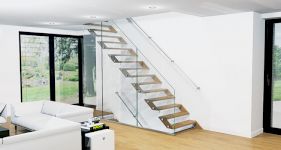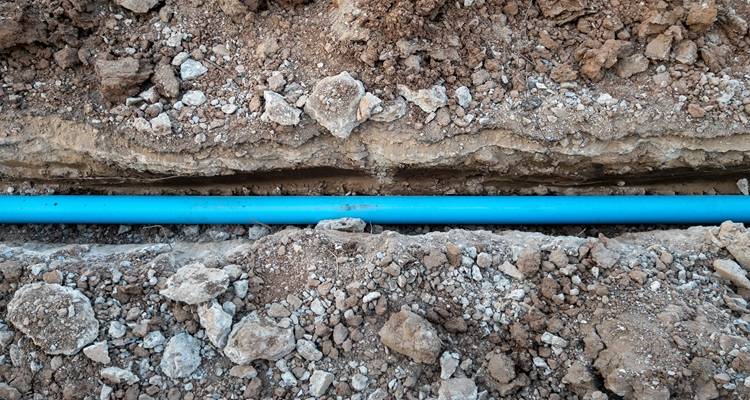Combi Boiler Installation Cost
- The average combi boiler installation cost is around £2,750 in the UK.
- It typically takes 1 day for a heating engineer to install a new combi boiler.
- How much a new combi boiler costs in the UK, the labour cost to fit a combi boiler, and what impacts the prices you're quoted in 2026.
- How long fitting a new combi boiler takes, what additional jobs you can schedule at the same time, and expert advice from tradespeople on MyJobQuote.
- How to find and hire a local heating engineer.

£2,750
Table of Contents
- How Much is a New Combi Boiler Installation?
- How Much Does a New Combi Boiler Cost? (Supply Only)
- Additional Combi Boiler Installation Costs
- How Much to Fit a Combi Boiler? (Labour Only)
- What Are the Different Types of Combi Boiler?
- What Size Combi Boiler Do I Need?
- What Impacts Combi Boiler Installation Costs?
- How Efficient Are Combi Boilers?
- Can I Install a Combi Boiler Myself?
- Building Regulations for Combi Boilers
- What's Involved in Installing a Combi Boiler?
- Checklist: Hiring a Combi Boiler Installer
- FAQs
- Sources
How Much is a New Combi Boiler Installation?
The cost of a new combi boiler will depend on several factors:
- The size of the boiler you need
- The system you're replacing
In the simplest case, where you are replacing an old combi boiler with a new one, you can expect to pay between £1,050 and £2,250 for a small 24kW to 27kW boiler.
A larger 35kW to 42kW boiler costs £1,400 to £3,700.

If you change to a combi boiler from another type of boiler, your prices will be higher.
For a small 24kW to 27kW boiler, you can expect to pay £1,650 to £3,050, while a larger 35kW to 42kW boiler costs £1,950 to £4,750.
I’m looking at buying a property with a back boiler. What would the likely cost be of removing this and replacing it with a combi boiler?
Combi Boiler Installation Prices
The cost of installing a new boiler depends not only on your new boiler, but also on the boiler it's replacing. To help you identify your costs, we've split the prices based on the system your new boiler is replacing.
The prices reflect a gas combi boiler, since 95% of the boilers bought in the UK are gas.
Replacing an Existing Combi Boiler
| Power Output Of New Boiler | Average Cost |
|---|---|
| 24 – 27 kW | £1,050 – £2,250 |
| 28 – 34 kW | £1,200 – £2,850 |
| 35 – 42 kW | £1,400 – £3,700 |
Changing Location of Combi Boiler
| Power Output Of New Boiler | Average Cost |
|---|---|
| 24 – 27 kW | £1,300 – £2,450 |
| 28 – 34 kW | £1,400 – £3,150 |
| 35 – 42 kW | £1,550 – £4,000 |
Changing Type of Boiler
| Power Output Of New Boiler | Average Cost |
|---|---|
| 24 – 27 kW | £1,650 – £3,050 |
| 28 – 34 kW | £1,750 – £3,700 |
| 35 – 42 kW | £1,950 – £4,750 |
How Much Does a New Combi Boiler Cost? (Supply Only)
The cost of a new boiler will depend on the size of the boiler as well as the type of fuel it uses. The following tables will give you an idea of the price you can expect to pay.
Gas Combi Boiler Prices
| Power Output | Average Cost |
|---|---|
| 24 – 27 kW | £525 – £1,500 |
| 28 – 34 kW | £575 – £2,150 |
| 35 – 42 kW | £800 – £2,950 |
Oil Combi Boiler Prices
| Power Output | Average Cost |
|---|---|
| 24 – 27 kW | £1,400 – £2,100 |
| 28 – 34 kW | £1,600 – £2,400 |
| 35 – 42 kW | £1,850 – £3,200 |
What's the quietest and most efficient combi boiler on the UK market?
LPG Combi Boiler Prices
| Power Output | Average Cost |
|---|---|
| 24 – 27 kW | £1,100 – £1,600 |
| 28 – 34 kW | £1,300 – £1,850 |
| 35 – 42 kW | £1,550 – £2,200 |
Electric Combi Boiler Prices
| Power Output | Average Cost |
|---|---|
| 9 kW | £1,600 – £2,600 |
| 12 kW | £1,600 – £2,600 |
| 14+ kW | £1,700 – £2,700 |
Additional Combi Boiler Installation Costs
When you get your new boiler, you may want to get a few other jobs done at the same time. If the jobs use the plumber or heating engineer at your property, you can save on additional call-out fees by getting the job done simultaneously.
Let's take a look at what you might want to consider for period and modern properties:
Additional Costs for Older Properties
Power Flush Costs
Power flushing is the best practice when installing a new boiler, but it's especially important in older properties where years of sludge and limescale may have built up in your pipes and radiators.
If you're installing a new central heating system to combat poor heat circulation in your home, you need to make sure you tackle issues in your pipework too, so you feel the benefits of the new system.
Some tradespeople will include this in the cost of fitting a new combi boiler, but this isn't always the case.
If charged seperately, you should expect power flush costs to be around £400, depending on the size of your central heating system.
Radiator Relocation Costs
Moving a radiator can completely change the feeling of a room - and, if you're having a new combi boiler installed, this is the perfect opportunity to relocate radiators in your home.
The typical cost of moving a radiator is around £275 in the UK. Moving a radiator takes between 2 and 5 hours per radiator, depending on the complexity and ease of access.
Radiator Replacement Costs
While it's best to try to rectify issues with your existing appliances, if your radiators are too damaged to be repaired, it's best to get them replaced. Things to look out for with old radiators include:
- Active leaks coming from the radiator, together with rust
- Issues with temperature persisting after a power flush
- If your radiators have changed shape (e.g. they're warping, bulging, or distorted)
If needed, it can be a cost-efficient move to have new radiators installed at the same time as getting a new boiler installed.
The average radiator replacement costs around £200 per radiator, and usually won't take more than 2 hours.
In most situations, your installer will dispose of your old radiators for you, which is usually included in their costs.
If it isn't, you may need to include the cost of skip hire into your budget. The average cost of hiring a skip is around £220.
Additional Costs for Newer Homes
Moving Your Boiler Costs
Installing new central heating can be a great opportunity to move the location of your boiler if its original position isn't ideal. Some properties have boilers in plain sight (e.g., taking up space in your kitchen), and moving them to your garage or utility room can be a great way to make the most of your kitchen's space.
It's important to note that if you're replacing your old boiler and moving its location, your costs will be higher than a straight like-for-like swap.
This is usually because modern condensing boilers need a drainpipe to remove the condensed vapour. So, if you have an old, non-condensing boiler, bear this extra cost in mind.
The average cost to move a boiler is around £725. However, you will likely be quoted a little less than this if you schedule this work at the same time as fitting a new boiler.
The cost of removing your old boiler will usually be included in the installation price of your new boiler. However, removing the old one before getting a new one should only take an hour or two, and will cost around £225 to £300.
Smart Thermostat Installation Costs
If you're upgrading your boiler to improve your home's energy efficiency, a good pairing is a smart thermostat. Smart thermostats can save 10% to 12% on your annual heating bills.
Typically, smart thermostat installation costs around £265, depending on the model you choose.
How Much to Fit a Combi Boiler? (Labour Only)
The labour costs of installing a new boiler will vary depending on what the new boiler is replacing. The process is quite simple if you replace a combi boiler with a new one.
It should cost around £550 to £800. New combi boiler installations can be done in a single day, taking between 4 and 6 hours.
If you need to change the location of your boiler, then the job will take a little longer and cost a little more. You can expect to pay £850 to £1,150, and the job should take 1 to 2 days to complete.
How much does a combi boiler installation cost (labour only)? Could I also get a price for replacing 11 radiators (4 doubles, supply and labour)?
For the radiators, I would say it's a day's work (if all went well), so between £300 and £400."
The most complex option is where you are changing the type of boiler. This could mean changing the fuel type or moving from a system boiler to a combi boiler.
The cost and timescale are about the same in both these situations. Here the combi boiler installation cost will be around £1,200 to £1,700. In this situation, the new boiler installation can take between 2 and 3 days to complete.
What Are the Different Types of Combi Boiler?
Different types of combi boilers are available - but what's best for your home can be limited by the fuel you can access. So, if you can't get a gas supply, then you will need to look at the alternatives.
Let's go through the different combi boiler types, their pros and cons, and installation costs.
Gas Combi Boiler Cost
These are the most commonly installed type of combi boiler in the UK. If you have access to gas, this is often the best choice, as your running costs will be the lowest compared to other fuel types.
The average cost of a gas combi boiler is £525 to £2,950.

Pros
- ✔ Lowest running costs compared to other boiler and fuel types
- ✔ Good availability, suitable for small and medium-sized homes
- ✔ Easy to install
Cons
- ✖ Installation needs to be completed by a Gas Safe registered engineer for safety
- ✖ If you aren't close to a gas supply, you can't have this type of boiler
- ✖ Although running costs are typically low, gas prices can change over time
Oil Combi Boiler Cost
If you live off the main gas grid, your next best choice of boiler is likely to be an oil combi. With this boiler type, you'll need an oil tanker fitted outside your home to supply your boiler, which you'll need to refill as needed.
The average cost of an oil combi boiler is £1,400 to £3,200.
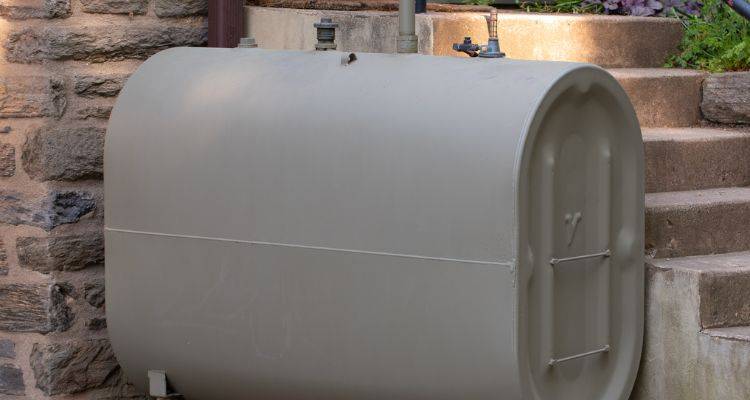
Pros
- ✔ Good fuel option for homes living off-grid from the mains gas supply
- ✔ Capable of heating large homes
- ✔ Some oil boilers can be more efficient at heating large homes than older gas boiler models
Cons
- ✖ Requires an oil tank installed outside your home, which can affect your property's aesthetic
- ✖ If deliveries of oil refills are delayed, you can be left without heat
- ✖ The price of oil can fluctuate
LPG Combi Boiler Cost
LPG combi boilers run almost the same way as a gas combi boiler. The only difference is that the gas comes from an external tank, making it a suitable alternative for homes off-grid.
The average cost of an LPG combi boiler is £1,100 to £2,200.
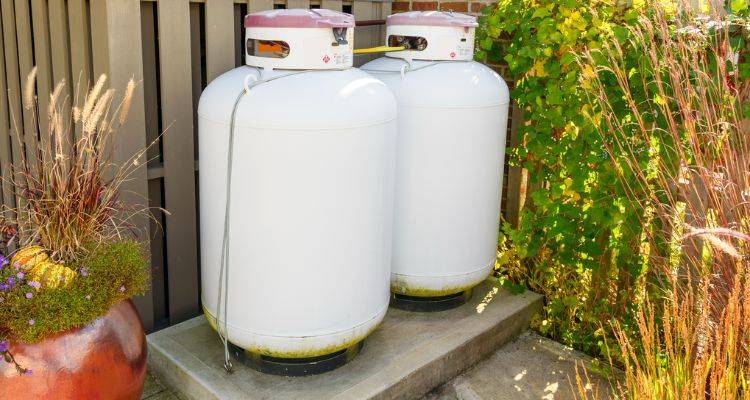
Pros
- ✔ Good option for homes off the main gas grid that still want to use gas fuel
- ✔ Gas burns cleaner compared to oil
- ✔ Installation costs are usually lower than oil combi boilers
Cons
- ✖ LPG boilers need an additional tank to store fuel, taking up a lot of space
- ✖ Running costs are higher than traditional gas combi boilers
- ✖ Deliveries of fuel can be delayed, and regular safety checks need to be conducted to ensure the storage is safe
Electric Combi Boiler Cost
Electric combi boilers use a system similar to an immersion heater to heat the water supply. They are often used only when the other options are too expensive or impractical.
The average cost of an electric combi boiler is £1,600 to £2,700.
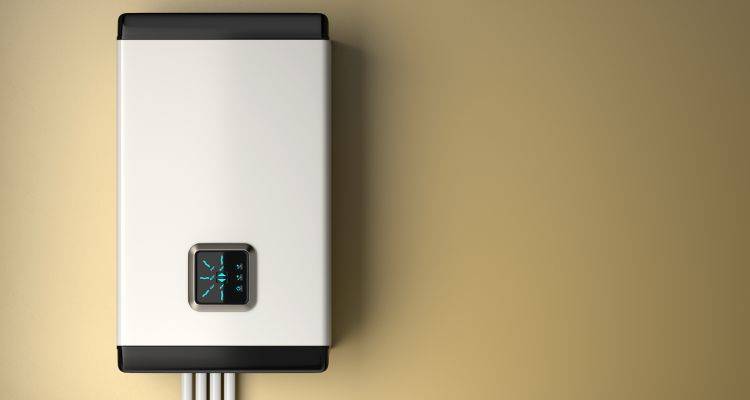
Pros
- ✔ Easy to install
- ✔ Good option for homes where gas or oil isn't suitable
- ✔ Small, compact design
Cons
- ✖ Running costs are far higher than gas or oil
- ✖ Not suitable for large homes with high hot water demand
- ✖ Can be slow to heat hot water
What Size Combi Boiler Do I Need?
The size of the boiler you need will depend on your home - the bigger your home, the bigger your boiler should be. It usually depends on the number of radiators and bathrooms.
It's important to choose the right boiler size:
- If your boiler is too small, it might be unable to keep up with the demand.
- If your boiler is too big, you can waste energy and money running it.
The following table can provide some guidance on the right size for your home:
| Number of Radiators | Number of Bathrooms | Boiler Output |
|---|---|---|
| 1 - 10 | 1 | 24 – 27 kW |
| 11 – 15 | 2 - 3 | 28 – 34 kW |
| 16 - 20 | More than 3 | 35 – 42 kW |
In some cases, the size of your boiler might be dictated by your water pressure, but this is rare, and your installer can check this for you.
What Impacts Combi Boiler Installation Costs?
There are two main considerations when it comes to combi boiler cost: the boiler itself, and how difficult it will be to install.
Size of Boiler
The larger the output of the boiler, the more it will cost. Heating a large home will cost more than heating a small, one-bed flat.
Type of Combi Boiler
If you need anything other than a gas-powered boiler, you will pay more.
Gas combi boilers are the most popular choice due to their efficiency and ease of installation. Combi boiler prices increase when you need a nonstandard fuel, like oil or LPG.

Location of Property
Labour costs are higher in some areas of the country. London, in particular, sees the highest labour costs of any part of the UK.
Ease Of Access
If it is difficult for your plumber to access the pipes they need, the job may take longer, which can increase the cost of the job.
It is a good idea to replace your boiler when you have other work done, like replacing flooring, for example. This can make access easier and reduce your costs.
Size Of House
The size of your home can impact the cost in two ways. First, you will need a bigger boiler if you have a large home. The second is that it can take longer to install if any work is needed on the pipes.
How much does it cost to replace a gas back boiler and fire with a new heating system, including a combi or condenser boiler and 7 radiators, in a terraced house with an attic?
How Efficient Are Combi Boilers?
Building regulations require all new boilers to meet minimum efficiency standards. This means that any boiler you buy will already meet the required standard.
All combi boilers are required to be a minimum of 92% efficient. However, some premium boiler manufacturers like Viessmann and Worcester Bosch can reach between 94% and 98% efficiency.
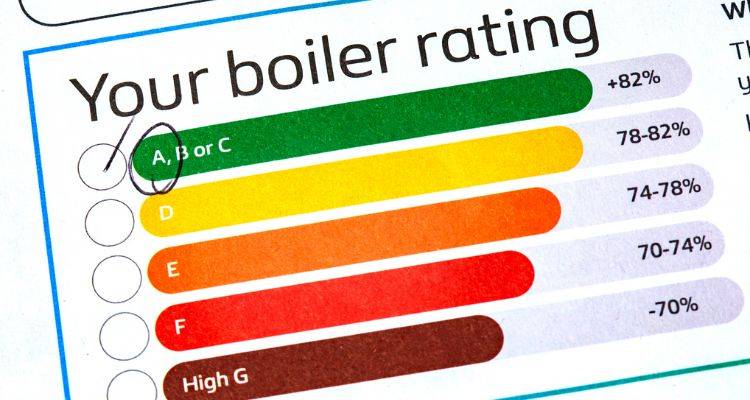
It's possible to reach 100% efficiency with an electric boiler, although the running costs are far higher than a traditional gas combi boiler.
If you have an old boiler, it might be a non-condensing model, which could be operating at just 55% efficiency.
Even if your boiler is from before 2018, it could have an efficiency of around 70% - even if it's a condensing boiler.
For the average household, moving from 70% to 92% efficiency can lead to an annual energy bill saving of £300, depending on your usage.
Can I Install a Combi Boiler Myself?
A gas boiler must be installed by a Gas Safe registered engineer. This is to ensure that the work is legal, safe and that it meets building regulations.
Working with gas can be dangerous, which is why this is not a DIY job.
Building Regulations for Combi Boilers
Building regulations apply to the installation of boilers. Some requirements cover how it should be installed, as well as the types of boilers that can be installed.
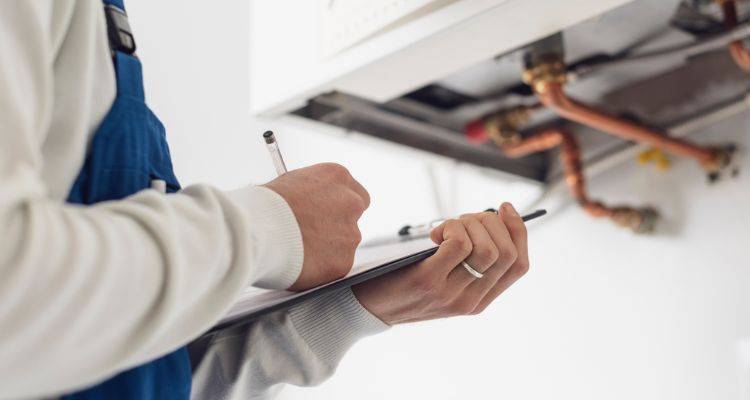
All installations must be carried out by suitably registered competent people.
- For gas boilers, this means a Gas Safe registered engineer.
- For oil boilers, this means using an OFTEC-registered installer.
- For electric boilers, this means using a qualified electrician who can self-certify under Part P of the Building Regulations.
If your installer has these qualifications, they will complete the work in line with the requirements of Approved Document J. They will be able to self-certify that the work was completed to the correct standard.
Is it possible to have a boiler installed in a bathroom?
Your boiler must meet building regulations. If it doesn't, it can be dangerous for your family and expensive to correct.
To find out more about how building regulations might apply to your situation, you can go to the government's online planning portal. Otherwise, you can speak to someone in the planning department of your local council.
What's Involved in Installing a Combi Boiler?
Now we know some typical boiler replacement costs, let's take a closer look at the process of installing a new combi boiler in your home:
- Initial consultation - Before the day of the installation, your installer will talk to you about the boiler you want, which serves as an opportunity to check that the boiler you want is appropriate for your house size and usage.
- Prepping the work area - Your plumber will lay down protective covers on the floor to protect them while they work, although some water spillage is hard to avoid.
The next steps will depend on the boiler system you currently have and whether you're swapping like-for-like, changing the boiler type, or moving the boiler itself.

Replacing an Old Combi Boiler With a New One
- The gas and water supply are safely switched off.
- The old boiler is disconnected and removed.
- The new boiler is mounted to the wall. If it has the same power rating as the old one, it should fit in the same location.
- Gas, water, and heating connections are reattached.
- The new system will then be tested and checked for pressure and leaks.

Moving Your Boiler or Changing Type of Boiler
- The gas and water supply are safely switched off.
- The old boiler is removed and disconnected.
- If you're changing from a system or conventional boiler to a combi boiler, and you have water tanks or hot water cylinders, they can be disconnected and removed.
- The boiler's new location will then be prepped. The engineer may need to add new pipework for the water supply, drainage, gas, and flue.
- The new boiler will then be mounted on the wall and connected.
- The new system will then be tested and checked for pressure and leaks.
Checklist: Hiring a Combi Boiler Installer
Getting a new boiler can sometimes be a decision that is made in haste. If your old boiler has broken down, then you may be pressed for time.
However, there are some things you should take the time to check before you choose your heating engineer:
- Gather at least 3 quotes from different traders to compare local prices.
- Make sure the quotes are itemised so you can see what's included. Do you need to pay more for extra pipework, waste removal, or relocating the boiler?
- Take a look at the trader's reviews and any photos or videos of their past work.
- If your boiler is gas-run, then you need to know that your engineer is Gas Safe registered. It is a legal requirement to work with gas.
- If your new boiler is oil-powered, then your installer must be OFTEC registered to be legally allowed to complete the work.
- Check that any heating engineer you are considering hiring is insured to complete the necessary work. This protects both you and them in case of an accident.
- A good engineer will be able to explain the system and what they will do. If they can't answer your questions, avoid using them.
FAQs
What is a combi boiler?
How does a combi boiler work?
What type of shower can you have with a combi boiler?
What temperature should hot water be set at combi boiler?
How long should a combi boiler last?
Are combi boilers an energy-efficient option?
Sources
https://www.planningportal.co.uk/permission/common-projects/boilers-and-heating/building-regulations
https://www.greenerkirkcaldy.org.uk/
https://lloydsgas.co.uk/blog/what-are-the-different-types-of-boiler-an-ultimate-boiler-guide/




